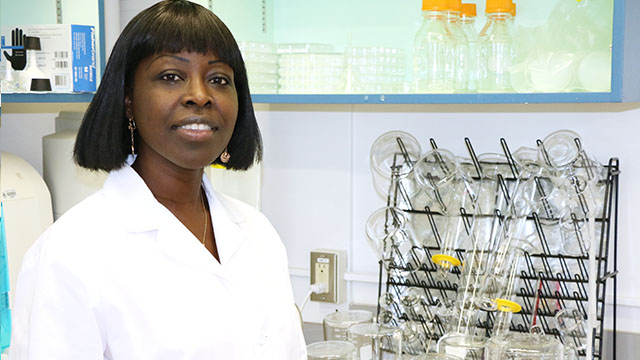
The title of the presentation was Malaria and pregnant women. "This is the most deadly parasitic disease in the world!" the Assistant Professor stated in her introduction.
As presented by the WHO (World Health Organization), Malaria is caused by parasites of the genus Plasmodium transmitted to humans by infected female Anopheles mosquitoes' bites, called "malaria vectors". There are six types of parasite species responsible for malaria but Plasmodium falciparum and Plasmodium vivax are the most dangerous.
According to WHO data, about 3.2 billion people - nearly half the world's population - are at risk of malaria. "This disease is rampant in sub-Saharan Africa, but it is also found in Latin America and parts of Asia. In 2013, 283 million people were diagnosed and 584 000 died, "says Ms. Gnidehou, noting that pregnant women and children under 5 years were most at risk.
Indeed, every year over 125 million pregnancies are exposed to malaria infections. "These infections cause maternal anemia, placental infection and parasite presence in the new-born," Sedami Gnidehou mentioned. The latter argues that women are more vulnerable to malaria during their first pregnancy. "The malaria susceptibility in women decreases with the number of pregnancies," she says.
VAR2CSA: vaccine candidate of hope
Over the years, a promising vaccine has been identified, it is the VAR2CSA. However, one of VAR2CSA weaknesses is that it is a large protein of 350 kDa (kilodalton) and it is difficult to prepare a vaccine with such a large protein. "With one of my French colleagues from the University Paris Descartes, we demonstrated that the N-terminal region of VAR2CSA is as functional as whole protein. Thus, we have demonstrated that antibodies directed against this region are capable of blocking the adhesion of parasites in placental receptor in the same manner as whole protein. These results were the subject of a patent. What pleases me is that a part of the region we identified is now in phase 1 clinical trial, "she mentioned.
Comparative analysis
The presence of malaria in Colombia and the absence of major effects of malaria in Colombian pregnant women was at the origin of a comparative study between this Latin America country and Benin, West African countries where malaria.is prevailing.
"Surprisingly, we found high levels of antibodies of VAR2CSA in primigravidae and multigravida Colombian women. "Interesting enough- contrary to men and children from Benin, antibodies against VAR2CSA were identified in Colombian men and children. Moreover, these antibodies are able to block the accession of parasites in placental receptor, "Mrs. Gnidehou added.
These findings led the Assistant Professor of biology to have a glimpse light of hope. "We made progress, which is promising, but we must remember that science sometimes can go slow." Whereas, we know today that malaria during pregnancy is a real public health issue and the VAR2CSA is a promising candidate vaccine against the Plasmodium falciparum malaria associated with pregnancy. Also, in contrast to data obtained from studies conducted in sub-Saharan Africa, Colombian men and children have functional antibodies against VAR2CSA, "she said.
This research continues as the Assistant Professor of Biology was recently awarded the Canadian Global Health Fellowship rising stars (Grand Challenges Canada). A sympathetic pregnancy vaccine: how men antibodies can protect women Pregnant against malaria.